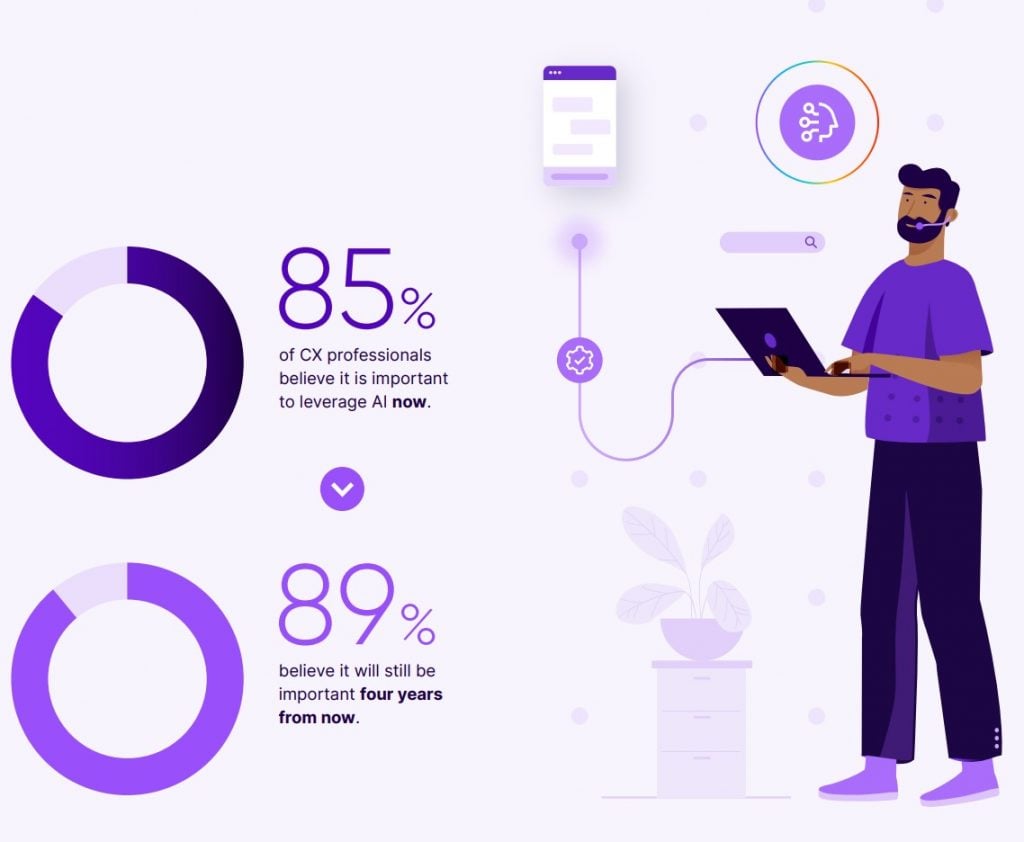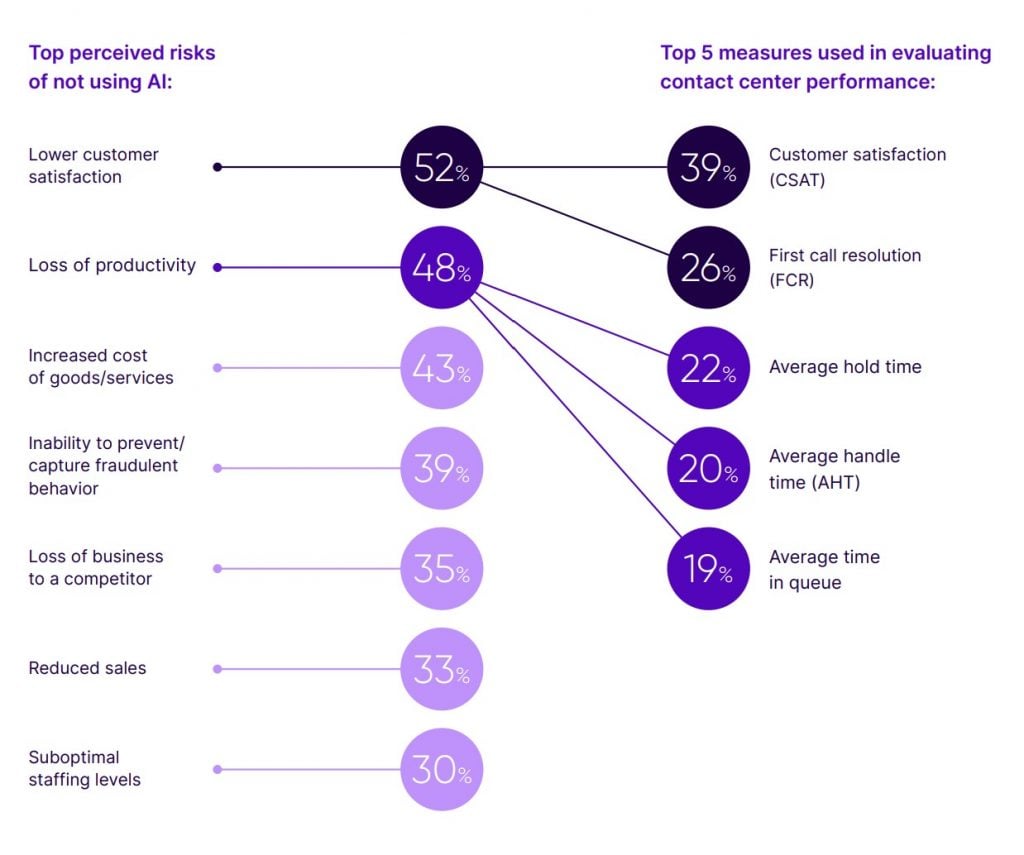It seems that the more I tell people what I do for a living, they say things like: "That's quite futuristic; what do you think about AI replacing humans at their jobs?" While this might be the case in some industries like the manufacturing industry, it is: not the case in areas like the contact center.
Humans will always resort to "asking for an agent" if they do not have luck with failed IVR and other self-service options that often frustrate humans. Yet, there still seems to be a commonly-understood notion that: humans will get replaced by machines. For this story, I will look at what the data say, and they could not be any more clear.
Humans will almost always resort to resolving complex queries with other humans when they reach out to a contact center. Even if that means taking advantage of omnichannel options when they chat with an agent live via a company website.
That could also very well come in the form of speaking to a human on a terrestrial phone - although it is more likely that communication would (take place) via a mobile device. According to Talkdesk; 79% of CX leaders say they plan to increase their investment in contact center artificial intelligence and automation. So doesn't this put a big fat hole in my theory? Still, no. Here's why:

The future of AI 2022, Progressing AI maturity in the contact center, Talkdesk Research Report
Talkdesk recently released its: Future of AI 2022, Progressing AI maturity in the contact center, research report, which notes that CX professionals cite leadership vision, security, and talent gaps as primary stumbling blocks in implementation progress and maturity of implementing a technology that will only augment agent performance.
"As a result of these obstacles, responses point to a slight slowdown in deployments with 60% of respondents currently using AI self-service compared with 69% last year."
Talkdesk further notes that an overwhelming majority (85%) recognize the importance of AI and automation and the risks of not leveraging them. Fifty-two percent of respondents to that Talkdesk survey cite risks to customer satisfaction, with 48% citing potential losses in productivity.
There Remains a Constant Demand for Human Agents
Furthermore, the survey unearthed that CX professionals report less confidence in their understanding of AI. "The percentage of those who say they feel 'moderately' to extremely familiar with AI in the contact center dipped from 93% a year ago to 87%," Talkdesk wrote in a statement.
While CX professionals may lack knowledge of AI and how to implement it: they tend to understand the benefits of contact center AI - as do many vendors. Vendors continually build features into their platforms that augment the job of agents. Take Zoom, for instance.
The video conferencing giant, much like many others in the industry, offers agents insights into what to do next. If an agent is unsure about the next steps it should take on a call: AI is often there to offer up recommendations on how to best resolve the reason a customer reached out in the first place.

The future of AI 2022, Progressing AI maturity in the contact center, Talkdesk Research Report
As we have grown to work in a more productivity and goals-based work environment, the addition of contact center AI; is often viewed by agents as somewhat of a godsend.
According to Google Cloud, its contact center AI enables agents to handle 28% more conversations; and can reduce operational costs. That has massive implications, such as decreasing average customer hold time and improving contact center metrics like handling peak traffic more efficiently.
Deploying Google's Contact Center AI - according to Google Cloud; can also improve customer satisfaction by up to ten percent, meaning agents extend a "consistent, high-quality experience." In the world of retail, ensuring you close the sale is paramount, and abandoned carts are a reality in that sphere.
Google notes that its software can reduce abandoned chats with a 15% faster response time: leveraging a handy feature. Its Smart Reply functionality extends some of the fastest-possible answers to customer queries via a quick search of its central knowledge base.
Contact center giants like Five9 seem to have mastered the concept of agent assist, as I have spoken with experts from the firm on numerous occasions on the benefits of agent assist. According to the popular cloud contact center provider, companies that combine AI with human agents report a 61% improvement in customer satisfaction.
They also report a 69% improvement in something often overlooked, agent satisfaction. Five9 also notes that 70% of companies say they will have adopted some form of AI, with the majority using a full range of AI technology, by 2030, with AI-centric CX expected to increase by 143% over the next 18 months.
CC and Manufacturing Automation are Non-Sequiturs
For starters, the goal of AI in both instances is to boost productivity. In manufacturing, however, two of the express goals remain to reduce human error and the time it takes to get to market. Overall, the process of automation in the space means that companies can earn greater profit margins while reducing things like the defect rate of items they manufacture.
Quality is another element that manufacturers cite for implementing more automation measures, and we have seen a rise over the past decade of millions being pushed out of their jobs in favor of machines. The short-term investment is a lot higher for machines, but the long-term benefits, for manufacturers, are unmatched.
In the contact center space, long-term growth, customer retention, and overall satisfaction rank among the highest goals. This makes human experiences in a customer-facing industry all the more relevant and impactful when customers have buying power.
There is also social media, which customers can take to if they have poor experiences, and that is something that is in no short supply, as most customers are willing to make the switch to a competitor in a heartbeat - granted they have a lackluster experience with technology or even a human agent, in most instances.
Pretty much the opposite can be said about automation in the contact center space, as humans and machines together, in this instance, can create a match that realizes customer service success.



